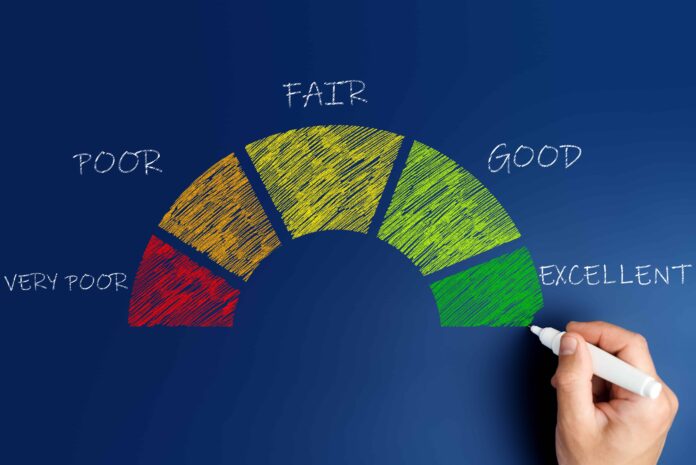When people think of “adulting” they usually think of things like a mortgage, taxes, and so on. One part that is usually important in your day-to-day is your credit score. However, a lot of people don’t know what the true point of a credit score is, or how to optimize their score. This can lead to people spending thousands of dollars more than they should. So don’t be your own worst enemy, and make sure you understand what credit is and how to properly build it up to greatness.
Understanding the Average Credit Score
The credit score: a three-digit number that can either open doors or slam them shut. In America, this magic number averages at 714. Your FICO® Score depends on a variety of factors. These factors include your:
- Payment history
- Amounts owed on loans and credit cards
- Length of your credit history
- New credits you’ve taken out recently
- Types of credits used – collectively known as ‘Credit Mix’.
These factors are compiled by major companies like FICO into single-digit representations – yes, these companies dominate the business of calculating our financial worthiness.
FICO vs VantageScore: Battle of the Credit Scores
When it comes to credit scores, it’s FICO vs VantageScore, the heavyweight showdown. These two companies dominate the credit scoring game, but they have different approaches. FICO® loves your payment history and how much you owe, while VantageScore looks at recent activity and even considers rent payments. However, FICO scores are the ones most commonly used model.
What Does Your Credit Score Mean?
When looking at FICO specifically, there are different ranges that indicate different things. FICO credit scores, which range from 300 to 850, represent an individual’s creditworthiness and are used by lenders to assess the likelihood of repayment. A score between 300 and 579 is considered “Very Poor,” which indicates that the individual has been very risky in their credit behavior. This can include having issues like several late payments, defaults, or even bankruptcies on their report. Scores from 580 to 669 are labeled as “Fair”, meaning they pose a moderate risk to lenders. This is typically due to some credit missteps but not a pattern of risky behavior.
A score between 670 and 739 is considered “Good” and is usually earned by people who pay their debts on time and keep their credit utilization low. Those with scores ranging from 740 to 799 have “Very Good” credit, showing a record of consistent, responsible credit management, and they may qualify for better interest rates. Lastly, a score from 800 to 850 is “Exceptional.” These individuals are the most creditworthy and have a history of outstanding credit management. They are likely to receive the best interest rates and most favorable terms on credit cards and loans. Please note that while these ranges are fairly standard, they can vary slightly between different credit reporting agencies and lenders.
Improving Your Credit Scores
The journey to better credit scores starts with paying your debts on time. It’s like hitting the bullseye in the credit world. So, don’t be fashionably late when it comes to paying your bills. Paying your debts on time is like flexing your financial responsibility muscles. It shows lenders that you’re reliable and less risky, which could lead to lower interest rates and higher credit limits.
Besides that, you want to keep your credit utilization rate in mind. Keeping a low balance compared to your credit limits is like wearing a superhero cape for your credit scores. It’s called the ‘Credit Utilization Rate,’ and it’s a big deal for FICO scores and other major scoring models. Here’s the secret: Use only 30% (or less) of your total available credit. It’s like showing off your financial management skills and impressing the credit gods.
There are ways that you can handle lowering your credit utilization ratio like the following:
- Credit Limit Increase: Ask your creditors to increase your limits. It’s like getting a bigger plate without having to eat more. Just don’t go on a spending spree.
- Frequent Balance Payments: Pay off your balances multiple times within billing cycles. It’s like keeping your credit utilization in check throughout the month instead of letting it pile up like dirty laundry.
- Diversify Card Usage: Spread out your charges among multiple cards. It’s as if you have a buffet of credit options and can manage your account ratios like a pro.
Growing Your Accounts Portfolio & Building Stronger History
To level up your credit game, consider opening new accounts that get reported to the credit bureaus. It’s like expanding your credit family. The three credit-reporting agencies, Equifax, Experian and TransUnion keep track of your credit history and determine your creditworthiness.
Having a mix of older and newer credit cards shows that you’re a credit connoisseur. It’s like adding depth and strength to your credit profile. So, keep those old cards active and welcome the new ones with open arms.
Monitoring Your Credit Score
Don’t underestimate the importance of keeping an eye on your credit score. It’s like having a financial crystal ball. There are opportunities to check your credit score for free and even get your credit report for free! Free credit information like this is your secret weapon in staying financially informed.
Why Regular Monitoring is a Must
Think your FICO® score stays steady? Think again. It’s like a wild ride with numbers that can change quickly. It’s also worth noting that certain factors that can bring your score down can stay on your credit report for years potentially!
Bottom Line
In conclusion, understanding and managing your credit score is a crucial aspect of adulting that goes beyond the stereotypical responsibilities such as mortgages and taxes. A good credit score can open doors for you, and understanding the factors that affect your score is important. This includes factors like payment history, debt amounts, credit history length, recent credits, and credit mix. The main players in credit scoring, FICO and VantageScore, use these factors differently, but timely payment of debts and maintaining a low credit utilization rate are essential for both. Regular monitoring of your credit score, diversifying card usage, and maintaining a mix of old and new accounts can also help you build a stronger credit profile. Having a stronger credit profile can help to your overall financial stability! Remember, being informed about your credit score isn’t just about avoiding financial pitfalls, but about actively building a more secure and prosperous future.








